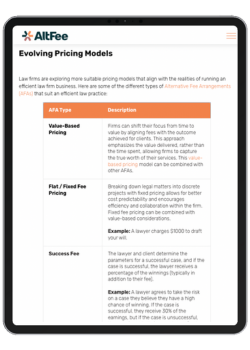- Resources
- 6 Benefits of Law Firm Knowledge Management
Table of Contents
Law firm knowledge management has never been more important.
Imagine being able to take a lawyer’s individual legal knowledge and share it with the rest of the law firm. Over time, you’ll have a goldmine of information just waiting to be consumed.
Knowledge management, in many ways, lies at the center of a law firm’s operations. The most important asset a law firm has is its professionals, and their individual knowledge, skills, and abilities. If an individual’s knowledge can be shared with others in the firm, it helps make the law firm more efficient and able to offer better service to its clients.
The impact that technology has had on the legal sector cannot be understated; firms are dealing with the rise of alternative legal service providers, clients with higher expectations when it comes to law firm technology (e.g. online payments), and overall navigation of an industry experiencing fast digital transformation.
Capturing the collective knowledge of legal professionals has been made easier and more efficient over the years because of the legal industry’s shift into embracing technology solutions.
This article discusses the importance of technology in knowledge management for law firms and outlines challenges, benefits, software solutions, and more.
What is Knowledge Management for Law Firms
Law firm knowledge management (KM) is the process of capturing, building, and storing a wealth of information and data that lawyers can search through to apply to legal matters. KM also includes leveraging the knowledge of a law firm’s legal professionals and staff members so the firm can work more efficiently. Sometimes, knowledge management software is also referred to as a document management system.
These days, law firm knowledge management software is an essential part of any law firm’s toolkit to capture and store important legal information, including cloud law firms. This software often includes AI, contextual searching, automations, and more to make finding, understanding, and using legal information quicker and easier.
Why is Knowledge Management Important?
The legal industry is inherently knowledge-based. There are so many different factors and nuances to consider when applying the law, that lawyers couldn’t possibly know absolutely everything. That’s why lawyers often specialize in a discipline or series of disciplines, because then they become experts in those areas, setting them apart and highlighting their skills and abilities.
Knowledge management for law firms means that specialized knowledge from lawyers can be saved, contextualized, and made available to other legal professionals within a law firm to use as needed. This means that knowledge transfer and sharing are encouraged, and the law firm works more like one unit rather than siloed teams or individuals.
AltFee fits within this line of thinking by providing a way for legal professionals to collaborate on pricing strategies. By using pricing templates that can be duplicated and adjusted for each client, and allowing comments and feedback to be left directly on each template, it’s easier for legal professionals to share their knowledge and work on providing the most effective pricing for each legal matter within their office. This aligns with the expectations of clients today, which is that law firms will provide efficient work, comprehensive timelines for completing legal matters, and value through highly knowledgeable lawyers and sharing of relevant legal information.
Start Earning More Revenue with Fixed Fees
Break free from hourly pricing and take the fear out of scoping and pricing client projects to start maximizing profitability.
Book A Demo
Using law firm knowledge management software means that lawyers can easily share relevant information with their clients. When used in conjunction with other software that facilitates stronger client-lawyer connections, like client portals, it’s easy to understand how the use of knowledge management and technology helps build stronger client relationships.
Challenges of Knowledge Management for Legal Professionals
While having a legal knowledge management system is a necessity for today’s law firms, implementing the software, putting information into it, and maintaining the software properly can pose some challenges. Legal professionals and stakeholders at law firms that want to implement a law firm knowledge management system should be aware of these challenges in advance, as well as potential solutions to address them.
Change Management
The main people-related issue has to do with change management. Technology is coming at the legal industry fast, and some professionals might have trouble adjusting to a significant change in how they store documents and convey their own legal knowledge. Some more seasoned lawyers that were used to keeping information “all in their head” and storing documents in physical files might need more support transitioning to a digital system. That being said, most lawyers recognize that evolving their skills and adapting to new technologies that are consistent with new standards for legal professionals comes with the territory of being a lawyer.
Highlighting what issues the legal knowledge management software solves, and providing a clear process that details the path forward for adopting this new technology should help with getting all legal professionals in a firm on board. If change management is approached correctly, then attitudes surrounding the adoption of law firm knowledge management software should be positive overall.
Ensuring a Process is Created and Followed
Law firms often handle thousands of documents. These documents are usually stored in a document management system (e.g. Sharepoint, Box, DocuWare) but using this system alone can quickly result in an overwhelming amount of information that’s hard to categorize and search through.
What legal knowledge management software does is turn a sea of information into a curated, distinct repository of information — but it requires a purposeful approach from the user.
Ensuring that information is entered and uploaded correctly so that the system can contextualize it properly for ease of access is important for the efficiency of the knowledge management system. All staff will likely need training and onboarding to ensure that the repository of internal knowledge remains useful.
Management of the System Itself
Law firms deal with thousands of documents, have dozens of processes, and otherwise access and store tons of data. Ensuring that a knowledge management system is useful to everyone accessing when there’s so much data to consider can present a challenge.
Creating and maintaining a useful repository of information using a legal knowledge management system can be a full-time job for some law firms. This professional can provide expertise in choosing and implementing a knowledge management system, as well as help keep the system on track and focused on the firm’s objectives, and ensure that information is categorized and organized in a thoughtful manner.
6 Benefits of Legal Knowledge Management
Knowledge management for legal professionals has a range of benefits that result in more productive, efficient work.
Knowledge management software in particular:
1. Provides a Centralized Database for Legal Information and Documents
When important documents and data are available in one location, it makes it easier for legal professionals to quickly find what they are looking for. Instead of sifting through an unmanageable sea of data or needing to ask others where to find certain information, legal knowledge management software keeps everything organized and searchable in one place.
2. Saves Time Searching for Legal Information and Experts
Legal professionals having to search for information in multiple areas can be inefficient and frustrating, especially when clients are looking for quick answers or a case has strict time constraints.
An example from Aderant demonstrates how multiple sources of information can be connected to make handling legal matters easier and faster.
Aderant worked with a law firm that had a large class-action lawsuit that included 6,000 matters. The firm had documents about the matters in their document management system (DMS), but attorneys still needed to switch systems to do things like check budgets or find docketing deadlines, which wasn’t the most efficient or easy way to find the information they needed.
As a solution, the firm implemented a KM project that added a knowledge tab within the DMS whose purpose was to pull information from sources outside the DMS relating to the case. This meant that court dates, news articles, research, and local jurisdiction rules were all available within one area.
3. Captures Context Rather Than Solely Being Document Storage
A knowledge management system is much more than a place to create and store documents — many solutions are set up to organically result in logical categorization and navigation of information, meaning that it’s easier to see the context behind that information. Going off of the example above, the knowledge tab was added to a specific case, meaning that the articles, research, and rules contained within it would be tied to only that case, meaning that the DMS was able to silo that information away from other areas, protecting the context of that information.
4. Keeps Processes Consistent
Processes and procedures exist for a reason: to do work in the most effective way possible, and to ensure consistency. With a knowledge management system, legal professionals don’t have to rely on asking others for guidance or feel stressed about whether they are doing an important process the right way. Instead, they can refer to the knowledge system and confirm each step of a process as they complete it. The knowledge management system does this by centralizing the storage of process documents, matter documents, SOPs, and more, making everything easy to access when needed.
5. Improves Productivity and Client Satisfaction
Clients are increasingly expecting quick and effective communication with their lawyers. The quicker that lawyers can get information to clients, the more it sets them apart from the competition and gives a good impression. Using a legal knowledge management system provides the perfect solution: because the information is easily accessible, things like legal service pricing, proposals, and more can be created and sent off to clients easier than ever before. This helps gain both the lawyer and law firm new business and helps maintain strong relationships with clients.
6. Supports Law Firm Growth
With so much competition out there for law firms in the form of alternative legal service providers and solo practitioners, it can be difficult for law firms to keep staff, let alone grow. Many law firms are embracing things like alternative fee arrangements and investing in their culture to attract and retain staff.
Knowledge management software supports a forward-thinking law firm by helping to minimize low-value-added work. This means reducing the time spent drafting a document (because a precedent exists), providing effective research resources (reducing frustration with research tasks), and overall minimizing the time needed for more administrative tasks, so the lawyer can focus on things that are more intellectually stimulating.
Law Firm Knowledge Management Software
We’ve discussed knowledge management software throughout this article, including what it is and the benefits that it provides. But what does this legal technology look like, and how does it even work?
Let’s take a look at some examples and explore their approaches to legal knowledge management.
Litera
As with most legal knowledge management solutions, Litera’s approach is to connect internal and external data sources within one system, and contextualize the information found in each of those data sources with specific clients and legal matters.
At the same time, the entire system is focused on collaboration. Internal and external search functionality allows legal professionals to reach out to experts with ease, and the ability to capture and contextualize specific data points makes it easy to send information to different parties like sending data to pricing teams to help them accurately scope and price matters.
West km
When it comes to legal knowledge management, West km by Thomson Reuters offers a couple of standout features. First, aside from your own internal documents, the system gives you access to Thomson Reuter’s library of legal research. What’s more, they’ve included a citation feature, making it quick and easy to cite any document within the database. Secondly, West km’s search feature inserts “key side flags” in the search results for your documents, which alert you to possible changes within a case, statute, or regulation from the information within the document.
Document360
Although not specifically built for the legal industry, Document360’s robust knowledge management software still provides more than enough functionality for law firms. Some standout features include their knowledge base portal, which is a dashboard that allows easy document production with a robust editor. For example, you can create several levels of categories and subcategories within the editor, and drag and drop them to rearrange the content if needed. It also shows you version history so you can keep track of changes. Their platform API lets you easily integrate the system within your firm’s own tech stack.
Knowledge Management in Law Firms Success Stories
Knowledge management in law firms is all well and good, but what are some of the real world, tangible benefits that actual law firms have seen?
Here are a few success stories where law firms saw positive outcomes from prioritizing knowledge management.
Howard Kennedy
As a London, England-based law firm, Howard Kennedy is uniquely positioned as a forward-thinking firm that focuses on providing clients with straightforward and actionable advice. They have over 150 lawyers and 350 employees in total who all work from a single office location. The firm offers legal services that include advisory, transactional, and dispute-related support for both individuals and businesses.
While Howard Kennedy was already using iManage Work to manage their documents and emails, they realized they needed a more effective solution to capitalize on the knowledge they built up within the system. They ended up implementing iManage Insight, which not only allowed them to enhance employee and stakeholder access to law firm knowledge, it also provides useful search features like showing related documents.
Lenczner Slaght
As with many law firms, the pandemic caused Lenczner Slaght to really face their current knowledge management solution head-on — and as it turns out, the decades-old software they were using no longer cut it.
What they needed was a law firm knowledge management solution that could survive into the future, and scale with their business. With ThoughtFarmer’s modern knowledge management software, Lenczner Slaght was able to optimize their firm’s existing intranet content, focusing on filling gaps and providing an easy way for everyone at the firm to access needed information.
The results were better productivity, reduced emails, and overall better communication with individuals inside and outside the firm.
Kennedys Law
As a global law firm with offices in more than 22 countries, Kennedys Law offers insurance services across a variety of industries. With lawyers working in different countries and offices, the need for effective knowledge sharing is essential. Kennedys Law needed a way to make it easy for lawyers to find knowledge assets, including precedents, templates, and more regardless of where they work.
Intelogy modeled a solution for Kennedys Law that allowed them to:
- Save files directly into Sharepoint, including Word, Excel, Powerpoint, and emails (including attachments)
- Submit content directly to Sharepoint
- A drop-off library that allows knowledge managers to approve content
Through this solution, the staff was able to quickly find relevant content with an easy-to-use system with intuitive and effective search.
Conclusion
To summarize, effective knowledge management for law firms includes:
- Leveraging the collective knowledge of your firm’s legal professionals to make legal work easier through ease of access to information and information sharing
- Contextualizing information so it’s tied to its original legal matter, client, or research source
- A consideration for change management and how the implementation of modern legal knowledge management software can be done properly and effectively, with minimal disruption to business operations
- A consideration for how processes influence effective knowledge management, and how to keep those processes consistent and effective over time
- How the knowledge management system will be maintained over time, and whether that maintenance requires a knowledge manager or other hired professional
As law firms continue to adopt modern methods for enhancing business operations, more thought needs to be given as to how these changes are implemented into the law firm. Although knowledge management within law firms isn’t a new development, the processes, software, and approach to it is. If law firms want to be successful with modern knowledge management practices, they must look at the big picture of how they want their firm’s collective knowledge to be disseminated, stored, and accessed.
Law firm knowledge management is much more than document storage, it includes holistic solutions for things like research and collaboration inside and outside of the firm as well. Pricing is especially important for a successful law firm. When you can collaborate on your law firm's pricing strategies, you’re offering better value to your clients, as well as more pricing confidence.
AltFee’s pricing collaboration software offers law firms an easy and effective way to manage pricing knowledge and involve all key internal stakeholders in legal matter pricing. Interested in learning more? Get a demo today!
Start Earning More Revenue with Fixed Fees
Break free from hourly pricing and take the fear out of scoping and pricing client projects to start maximizing profitability.
Book A Demo





Newsletter Signup
Subscribe to our newsletter to receive the latest news.





